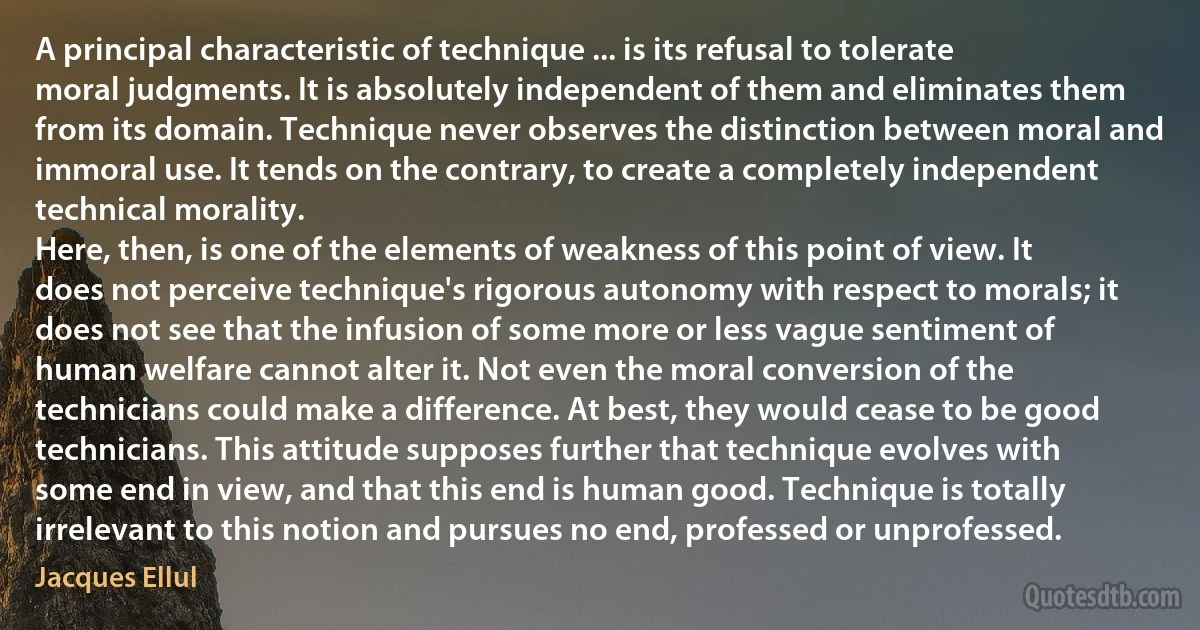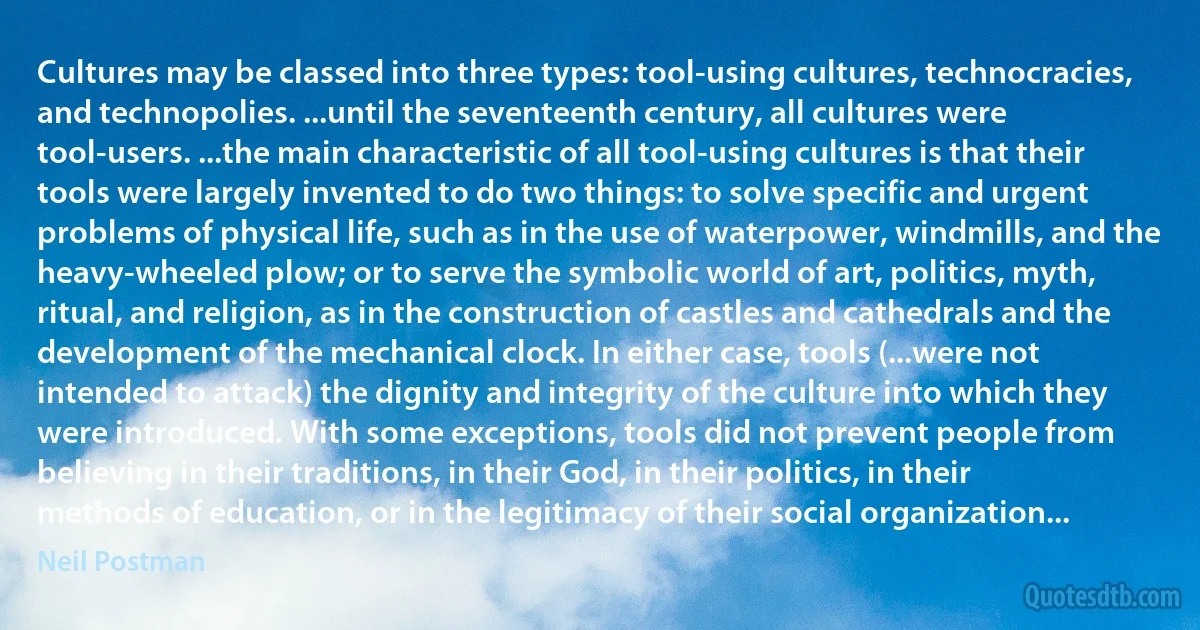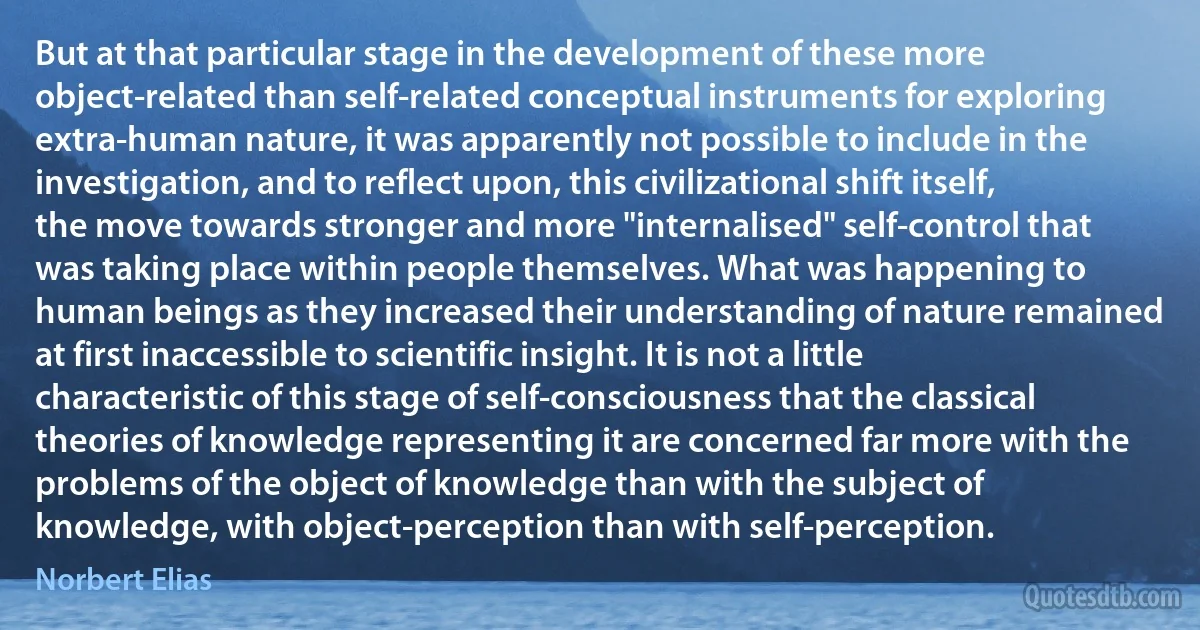Characteristic Quotes - page 20
"All men", said Aristotle, "by nature desire to know." The pursuit of truth, the effort to comprehend, arrange, interpret some aspect or other of the universe we perceive, is an activity of humanity which justifies, rewards and motivates itself. The study of something for its own sake, for the sake of knowing, understanding, grasping it and for nothing else, is an essential characteristic of education, lower or higher, though more obviously of higher education. The content of education must therefore be that which men would wish to know for its own sake.

Enoch Powell
The English state was the only one which finally resolved the great debate of the Middle Ages by the principle of supremacy, that is, by refusing to recognise that there could be any power or right of human compulsion over its members which derived from a source outside the realm, or that there could be concurrent sources of compulsion within the realm. This solution reflects, and no doubt emphasises, a characteristic of this nation which differentiates it from other European nations on either side of the Atlantic more than we or they commonly recognise. On the European mainland and in America concurrence of powers and limitation of sovereignty are taken for granted; in Britain we simply do not imagine them... In the United Kingdom the ultimate sovereignty resides in one person, upon whose authority when in Parliament the law knows no limitations.

Enoch Powell
It is the natural and correct attitude of mind for each of us to have regard for our own race and the place of our own origin. There is abundant room here for the preservation and development of the many divergent virtues that are characteristic of the different races which have made America their home. They ought to cling to all these virtues and cultivate them tenaciously. It is my own belief that in this land of freedom new arrivals should especially keep up their devotion to religion. Disregarding the need of the individual for a religious life, I feel that there is a more urgent necessity, based on the requirements of good citizenship and the maintenance of our institutions, for devotion to religion in America than anywhere else in the world. One of the greatest dangers that beset those coming to this country, especially those of the younger generation, is that they will fall away from the religion of their fathers, and never become attached to any other faith.

Calvin Coolidge
This is the main thought which your presence here brings to my mind. Let us maintain all the high ideals which have been characteristic of our different races at home. Let us keep our desire to help other lands as a great and broad principle, not to help in one place and do harm in another, but to render assistance everywhere. Let us remember also that the best method of promoting this action is by giving undivided allegiance to America, maintaining its institutions, supporting its Government, and, by leaving it internally harmonious, making it eternally powerful in promoting a reign of justice and mercy throughout the earth.

Calvin Coolidge
The duties of a Prince Ameth are, to be earnest, true, reliable, And sincere; to protect the people against illegal impositions and exactions; to contend for their political rights, and to see, as far as he may or can, that those bear the burdens who reap the benefits of the Government.
You are to be true unto all men.
You are to be frank and sincere in all things.
You are to be earnest in doing whatever it is your duty to do.
And no man must repent that he has relied upon your resolve, your profession, or your word.
The great distinguishing characteristic of a Mason is sympathy with his kind. He recognizes in the human race one great family, all connected with himself by those invisible links, and that mighty net-work of circumstance, forged and woven by God.

Albert Pike
The interest of research workers has frequently been focused on the phenomenon of regularly shaped crystals suddenly forming from a liquid, e.g. a supersaturated salt solution. According to the atomic theory the forming force in this process is to a certain extent the symmetry characteristic of the solution to Schrödinger's wave equation, and to that extent crystallization is explained by the atomic theory. Nevertheless this process retains a statistical and - one might almost say - historical element which cannot be further reduced: even when the state of the liquid is completely known before crystallization, the shape of the crystal is not determined by the laws of quantum mechanics. The formation of regular shapes is just far more probable than that of a shapeless lump. But the ultimate shape owes its genesis partly to an element of chance which in principle cannot be analysed further.

Werner Heisenberg
While ritual, emotion and reasoning are all significant aspects of human nature, the most nearly unique human characteristic is the ability to associate abstractly and to reason. Curiosity and the urge to solve problems are the emotional hallmarks of our species; and the most characteristically human activities are mathematics, science, technology, music and the arts--a somewhat broader range of subjects than is usually included under the "humanities.” Indeed, in its common usage this very word seems to reflect a peculiar narrowness of vision about what is human. Mathematics is as much a "humanity” as poetry.

Carl Sagan
In literature and in art, alike, this gloomy fashion of regarding Death has been characteristic of Christianity. Death has been painted as a skeleton grasping a scythe, a grinning skull, a threatening figure with terrible face and uplifted dart, a bony scarecrow shaking an hourglass – all that could alarm and repel has been gathered round this rightly-named King of Terrors. Milton, who has done so much with his stately rhythm to mould the popular conceptions of modern Christianity, has used all the sinewy strength of his magnificent diction to surround with horror the figure of Death.

Annie Besant
The relation between psyche and soma, mind and brain, are peculiarly intimate; but, as in marriage, the partners are not inseparable: indeed their divorce was one of the conditions for the mind's independent history and its cumulative achievements.
But the human mind possesses a special advantage over the brain: for once it has created impressive symbols and has stored significant memories, it can transfer its characteristic activities to materials like to stone and paper that outlast the original brain's brief life-span. When the organism dies, the brain dies, too, with all its lifetime accumulations. But the mind reproduces itself by transmitting its symbols to other intermediaries, human and mechanical, than the particular brain that first assembled them.

Lewis Mumford
There can be no doubt that Jesus was a remarkably cheerful person and that his joy, like his faith and hope, was infectious. This was in fact the most characteristic and most noticeable difference between Jesus and John. As we shall see later, Jesus feasted while John fasted (Luke 7:31-34).

Albert Nolan
Protagonists don't have to be likable. They just have to be compelling. The key characteristic of a protagonist, whether they are conventionally good or evil, is that the reader must be interested in knowing what they will do next, or how they will respond to what happens to them. I've mentioned elsewhere how much I detest all that ‘hero's journey' crap...

Tade Thompson
Thus we may infer that the only characteristic difference between modern Christianity and the old heathen faiths is the belief of the former in a personal devil and in hell. "The Aryan nations had no devil," says Max Muller. "Pluto, though of a sombre character, was a very respectable personage; and Loki (the Scandinavian), though a mischievous person, was not a fiend. The German Goddess, Hell, too, like Proserpine, had once seen better days. Thus, when the Germans were indoctrinated with the idea of a real devil, the Semitic Seth, Satan or Diabolus, they treated him in the most good-humored way."

Max Müller
[T]he broad movement oriented toward advocacy for sexual minorities has become more hysterical and more insistent as the stakes have in general declined. This is characteristic of many similar political movements: We have much cleaner air and water today than we did a generation ago, but the environmental movement is six times as hysterical as it once was. It is a curious thing.

Kevin D. Williamson
I don't think we have to do it by government spending. My view is I've never heard of a poor person spending himself into prosperity. The government doesn't create resources. The government redistributes them, and it redistributes them from workers and producers to people they get the resources based on some characteristic of the work effort. So what you really need to do is I think you need to incentivize producers, and what you need to go along, and my way of going would be Simpson-Bowles. Something to lower the tax rates, broaden the base, get rid of the loopholes. I mean really get a production base that officially starts, and that's the way you really get out of this depression. The way we did in the Eighties to be honest with you.

Arthur Laffer
One of the things that amazed the earliest explorers, almost without exception, was the hospitality with which Indians received them. When the Indians later learned that the Whites posed a threat, their attitude changed, but the initial contacts were idyllic. ...Hospitality and sharing were characteristic of all Indian societies.

Peter Farb
Given what a powerful determinant, mostly for ill, skin color has been in human history and individual experience, it is surprising how little we know about its underlying genetics. This deficit, however, may have had less to do with the limitations of our science and more with the intrusion of politics into science; in an academic world terrorized by political correctness, even to study the molecular basis of such a characteristic has been something of a taboo.

James D. Watson
The common characteristic of all perversions, on the other hand, is that they have abandoned reproduction as their aim. We term sexual activity perverse when it has renounced the aim of reproduction and follows the pursuit of pleasure as an independent goal. And so you realize that the turning point in the development of sexual life lies in its subjugation to the purpose of reproduction. Everything this side of the turning point, everything that has given up this purpose and serves the pursuit of pleasure alone, must carry the term "perverse" and as such be regarded with contempt.

Sigmund Freud
[T]he first characteristic of the human species is man's ability, as a rational being, to establish character for himself, as well as for the society into which nature has placed him. This ability, however, presupposes an already favorable natural predisposition and an inclination to the good in man, because the evil is really without character (since it is at odds with itself, and since it does not tolerate any lasting principle within itself)

Immanuel Kant
And certainly we should take care not to make the intellect our god; it has, of course, powerful muscles, but no personality. It cannot lead, it can only serve; and it is not fastidious in its choice of a leader. This characteristic is reflected in the qualities of its priests, the intellectuals. The intellect has a sharp eye for methods and tools, but is blind to ends and values. So it is no wonder that this fatal blindness is handed on from old to young and today involves a whole generation.

Albert Einstein



